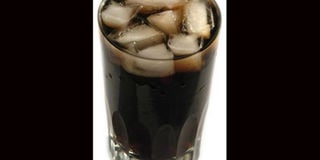Prime
That soda could put your health in danger

A 300ml bottle of soda has about 50mg of sugar
Many people can’t have a good meal minus soda while some parents use it as a reward for well behaving children. But is it good for our health? Agnes K. Namaganda finds out
I visited a restaurant recently over lunch break. A quick eye swoop of the 27 people having their meal showed that 20 were having a soft drink to go with their meal. And a feature of a prominent Member of Parliament’s family in the news recently showed their dining table filled with lots of soda in addition to other items.
Years ago, soda was the preserve of parties and ceremonies. You would look forward to take one because you had it probably only five times a year. But now that it is more easily obtained and more people can afford it, one can have a bottle almost every day if they wished.
But how many people know that soda is simply a mixture of chemicals labelled and designed to taste like pineapples, oranges and passion fruit? Even those who know, continue to prefer soda over juice or water. What’s more disheartening is the image it has been painted with before children. Soda is used as a treat for good behaviour. A child who hates school is sometimes baited with carrying soda as a snack to convince him or her to go. Fizzy drinks are also associated with outings and Sunday lunches. And most parents in an effort to demystify this serve it wherever and whenever. Sometimes parents who know better are arm-twisted by that screaming little brat and can’t help but hand over that bottle to the child.
However, parents should exercise more doggedness when it comes to refraining from handing their children sodas. This is due to various side-effects of the chemicals found in soda especially for children as Peter Rukundo, a dietician with Makerere University’s Food and Science and Technology department states.
The dietician says one small teaspoonful of sugar is about 5mg and on average most people take about one or two of these in a 300ml cup of tea. Well, a 300ml bottle of soda has about 50mg of sugar, an equivalent of a whooping 10 teaspoonfuls of sugar in the same amount of drink!
Dr Henry Bukenya a physician at Mulago Hospital says “Apart from having no nutritional value, fizzy drinks especially when taken before eating food or when hungry can disrupt the functioning of the digestive system causing a stomach complication called gastroenteritis.” The gases can also have a corrosive effect on the stomach leading to Peptic Ulcer Disease (PUD).
Although most of the chemicals in soda are soluble in water, your kidney will be working hard at filtering out these acids and impurities from your system, something Mr Rukundo says exerts too much stress on this vital body organ and can lead to the breakdown of your renal system.
A break down in your renal system or the inability of your kidney to capably filter out this overload of sugars, acids and impurities can lead to too many toxins circulating in your body. This can lead to conditions like diabetes and other related diseases like hypertension (high blood pressure), cardiac complications, obesity and cancers.
Soda also has acidic preservatives like phosphoric acid, sodium sulphide and sodium benzoate. Therefore, a high intake of these carbonated drinks can also lead to tooth decay as the acid preservatives dissolve some of the minerals like calcium and phosphorus from which teeth are made. “Tooth decay is worse in children whose dentition is still tender and can quite easily dissolve in the acids,” Mr Rukundo adds.
Soda also causes indigestion because the chemicals can upset or react with your food enzymes which are chemical in nature causing malfunction. “Foods like meats require vitamins and minerals to aid in their break down, something that is absent from fizzy drinks. Juice will facilitate your metabolism better for that reason,” Mr Rukundo advises.
Dr Bukenya adds that the sweetness of soda can also cause loss of appetite because you’ll need to eat something that’s equally sharp in taste like meat to compliment it otherwise it’s easy to fail to eat if your meal is bland in taste like beans or vegetables which can translate in loss of appetite. When your body starts demanding for meat instead of vegetables, this will mean a high intake of calories and fat which can offset diabetes and all the other related diseases.




